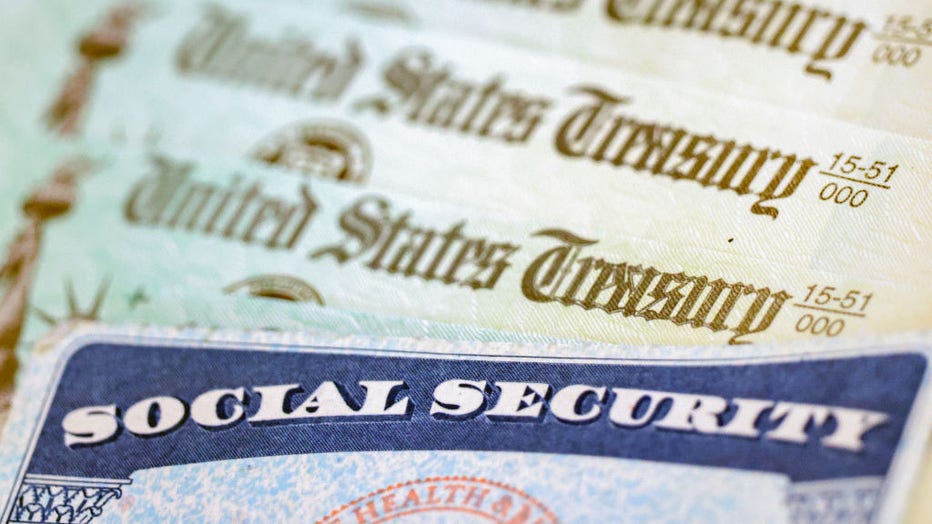Social Security benefits to jump by 8.7% in 2023
WASHINGTON - Millions of Social Security recipients will get an 8.7% boost in their benefits in 2023.
That’s a historic increase and welcome news for American retirees and others — but it’s tempered by the fact that it’s fueled by record-high inflation that’s raised the cost of everyday living.
The cost-of living adjustment means the average recipient will receive more than $140 extra a month beginning in January, according to estimates released Thursday by the Social Security Administration.
The boost in benefits, the biggest in 40 years, will be coupled with a 3% drop in Medicare Part B premiums, meaning retirees will get the full impact of the jump in Social Security benefits.
"This year’s substantial Social Security cost-of-living adjustment is the first time in over a decade that Medicare premiums are not rising and shows that we can provide more support to older Americans who count on the benefits they have earned," said Social Security Administration’s Acting Commissioner Kilolo Kijakaz.

FILE - In this photo illustration, a Social Security card sits alongside checks from the U.S. Treasury on Oct. 14, 2021, in Washington, D.C. (Photo illustration by Kevin Dietsch/Getty Images)
However, a separate government report showed inflation newly accelerating, a trend eating into the Social Security gains for older people. The Consumer Price Index rose 0.4 percent for September after just 0.1 percent in August and is up 8.2 percent for the past 12 months. Jobless claims for unemployment benefits rose for the week.
Stock futures declined before U.S. markets opened.
The announcement came just weeks before the midterm elections, and at a time when Democrats and Republicans are sparring about high prices now and how best to shore up the program financially in the future.
President Joe Biden has pledged to protect both Social Security and Medicare. "I’ll make them stronger," he said last month. "And I’ll lower your cost to be able to keep them."
About 70 million people — including retirees, disabled people and children — receive Social Security benefits. This will be the biggest increase in benefits that baby boomers, those born between the years 1946 and 1964, have ever seen.
Willie Clark, 65, of Waukegan, Illinois, says his budget is "real tight" and the increase in his Social Security disability benefits could give him some breathing room to cover the cost of the household expenses he's been holding off on.
Still, he doubts how much of the extra money will end up in his pocket. His rent in an apartment building subsidized by the U.S. Department of Housing and Urban Development is based on his income, so he expects that will rise, too.
RELATED: Americans changing holiday travel plans due to inflation, survey finds
Social Security is financed by payroll taxes collected from workers and their employers. The maximum amount of earnings subject to Social Security payroll taxes for 2023 is $160,200.
The financing setup dates to the 1930s, the brainchild of President Franklin D. Roosevelt, who believed a payroll tax would foster among average Americans a sense of ownership that would protect the program from political interference.
Next year's higher payout, without an accompanying increase in Social Security contributions, could put additional pressure on a system that's facing a severe shortfall in coming years.
The annual Social Security and Medicare trustees report released in June says the program's trust fund will be unable to pay full benefits beginning in 2035.
If the trust fund is depleted, the government will be able to pay only 80% of scheduled benefits, the report said. Medicare will be able to pay 90% of total scheduled benefits if the fund is depleted.
In January, a Pew Research Center poll showed 57% of U.S. adults saying that "taking steps to make the Social Security system financially sound" was a top priority for the president and Congress to address this year. Securing Social Security got bipartisan support, with 56% of Democrats and 58% of Republicans calling it a top priority.
Some solutions for reforming Social Security have been proposed — but none has moved forward in a sharply partisan Congress.
Earlier this year, Sen. Rick Scott, R-Fla., issued a detailed plan that would require Congress to come up with a proposal to adequately fund Social Security and Medicare or potentially phase them out.
Senate Minority Leader Mitch McConnell, R-Ky., publicly rebuked the plan and Biden has used Scott's proposal as a political bludgeon against Republicans ahead of midterm elections.
"If Republicans in Congress have their way, seniors will pay more for prescription drugs and their Social Security benefits will never be secure," Jean-Pierre said.
RELATED: 22% of millennials going into debt from dating amid high inflation, survey finds
___
Claire Savage in Chicago contributed to this report.


